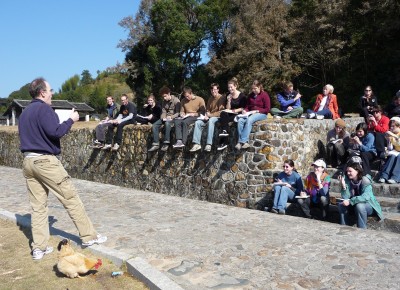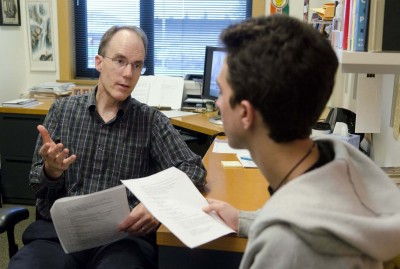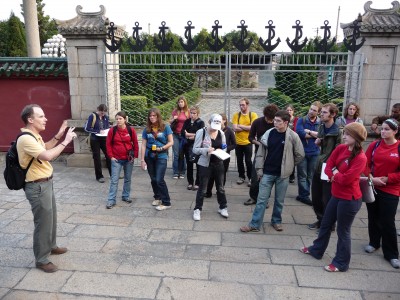Politics and Government professor captures prestigious, national award for teaching and scholarship
TACOMA, Wash. – With chickens pecking around his feet and 25 rapt students before him in an ancient Chinese courtyard in Fujian province, Professor Karl Fields told the story of Mao Zedong’s historic “Long March” in 1933. It was a desperate retreat by a rag-tag band of Chinese Communists, Fields said—one which began from the very village where they now stood.
The students who listened to this lecture amid the dust of an ancestral hall knew then, or later in life came to realize, that they were in the hands of an exceptional teacher. For Fields, too, the study abroad trip was an important turning point in his lessons.
“For all that we can do for students in the classroom, I am convinced there is really no substitute for being there,” Fields says. “It secures the knowledge and heightens the knowledge with an experience that sears it into your soul.”
Today it came as no surprise to anyone who knows Karl Fields, professor of politics and government at University of Puget Sound, that he has been chosen for the 2012 Washington State Professor of the Year Award. The recognition, from the Carnegie Foundation for the Advancement of Teaching and the Council for Advancement and Support of Education, is the country’s most prestigious honor for undergraduate teaching in higher education.This is the seventh such honor awarded to a Puget Sound professor, giving the Tacoma, Wash., national liberal arts college more Professor of the Year titles than any other college or university in the state. Fields will be presented with the award today at a luncheon at The National Press Club in Washington, D.C.
“I have met with graduates in Seattle and New York, Hong Kong and Tokyo, Shanghai and London—all of whose lives were reshaped by the influence of Karl and the Asian Studies Program,” said Puget Sound President Ronald R. Thomas. “His excellence in teaching comes not just from his brilliant lectures, but equally from an intensely humane and authentic investment in the discipline and culture he loves and in the students for whom he cares so deeply.”
Ask many of Fields’ students, and they insist this is no exaggeration.
“Karl is not a flashy teacher,” wrote Lisa Long ’04 in a student testimony. “He does not raise his voice or use rhetoric to draw in his audience . . . (but his) exceptionally strong character and integrity continue to awe . . . His students will quickly admit that he is the best professor they’ve had, but it is only later in life that his lessons transform from content-based knowledge at the academic level into a relevant life understanding and a deep-seated appreciation of our place in the world.”
Matt Ferchen ’93, associate professor at Tsinghua University in China, met Fields when he was a freshman more than 20 years ago.
“Practically every time I would visit Karl’s office to discuss a class project or research paper, which was regularly, he would get on the phone to his network of colleagues around the country to ask them for their advice,” Ferchen wrote. “Only later did I realize that he was calling the top young scholars in the field.”
Fields offered help and advice as Ferchen won a fellowship to Johns Hopkins University, earned a Ph.D. degree at Cornell University, and then boldly became the first foreign faculty member to take a tenure track job at a top Chinese university.
Rachael Gary ’12 wrote how Fields’ classes are “a joy to attend” and vowed that he has been “one of the most influential figures in my life.”
“His office door is always open—once he even arranged to Skype with me about a project while I was abroad in India, waking up absurdly early so he could accommodate my schedule across time zones.” Students talk about how Fields seems “eager to learn from me too” and how he challenges them to “take the leap” and discover their own talents and resourcefulness.
Fields has taught his students twice on foreign soil during Puget Sound’s nine-month PacRim study abroad excursion through Asia. He participated in the development of the first-ever International Political Economy Program for undergraduates in the country, and co-wrote a comparative politics textbook that has since been adopted at more than 200 schools.
Once seemingly destined to be a fourth-generation, Idaho cattle rancher, Fields says he fell in love with teaching during his own college years. His highest objective is to inspire students to take full responsibility for their own learning—and for teaching others. He will hand classes over to well-primed students and sit unobtrusively in the back row as they debate the issues, or he’ll keep students on their toes with intensive writing exercises, daily quizzes, multi-media presentations, and by challenging them with thorny political issues.
“Posing puzzles and giving students the ability to address these puzzles seems more important to me than giving students answers,” he explains.
On learning he was nominated for the award, Fields informed the judging committee that he was honored. But, he added, on looking up at the 20 years’ of postcards, Mao kitsch, and other political souvenirs carried back to him by students, “I must confess that these mementos and the exceptional associations they represent with students who have shared their lives and love for learning with me, mean even more.”
Karl Fields is a distinguished professor of politics and government and a recent director of the Asian Studies Program at University of Puget Sound, where he has taught since 1990. Fluent in Chinese and conversant in Japanese, he teaches comparative politics, comparative political economy, and the politics and societies of Asia. Fields chaired the politics and government department from 2000 to 2004. A teacher, scholar, author, lecturer, consultant, and reviewer, he travels and lectures regularly in the United States and Asia. He is co-author of the textbook Cases in Comparative Politics and the author of chapters in numerous books on Asian business, economics, and politics. He currently is at work on the book KMT, Inc.: Party Capitalism in a Developmental State. Fields earned a bachelor’s degree in political science, magna cum laude, at Brigham Young University, and a master’s degree and Ph.D. in political science from University of California, Berkeley.
Previous Washington Professors of the Year include: Mike Veseth (2010), Jim Evans (2008), Nancy Bristow (2007), Suzanne Barnett (2002), Mott Greene (1996), and Bob Albertson (1985).
The U.S. Professors of the Year program salutes the most outstanding undergraduate instructors in the country—those who excel as teachers and influence the lives and careers of their students. Nominees are selected by their own institution and are judged by two separate panels of education experts and professionals on the basis of criteria including their impact on students, scholarly approach to teaching, and contribution to education in the institution, community, and profession. This year, professors from 30 states and the District of Columbia were chosen for an award, from a pool of 300 nominees. For more information visit: www.usprofessorsoftheyear.org.
CASE and the Carnegie Foundation have been partners in offering the U.S. Professors of the Year awards program since 1981. TIAA-CREF, a leading financial services organization, is the principal sponsor for the awards luncheon. Additional support is received from a number of higher education associations, including Phi Beta Kappa, which sponsors an evening congressional reception.
Press photos of Karl Fields can be downloaded from: www.pugetsound.edu/pressphotos
Photos on page: Top right: Karl Fields in classroom; Above and lower left: Pacific Rim study abroad trip with Professor Fields; Above right: A student seeks guidance.
Tweet this: Karl Fields @univpugetsound is 2012 Washington Professor of the Year! That makes seven POY awards for Puget Sound. http://bit.ly/Qg3eOh
Follow us on Twitter! www.twitter.com/univpugetsound




